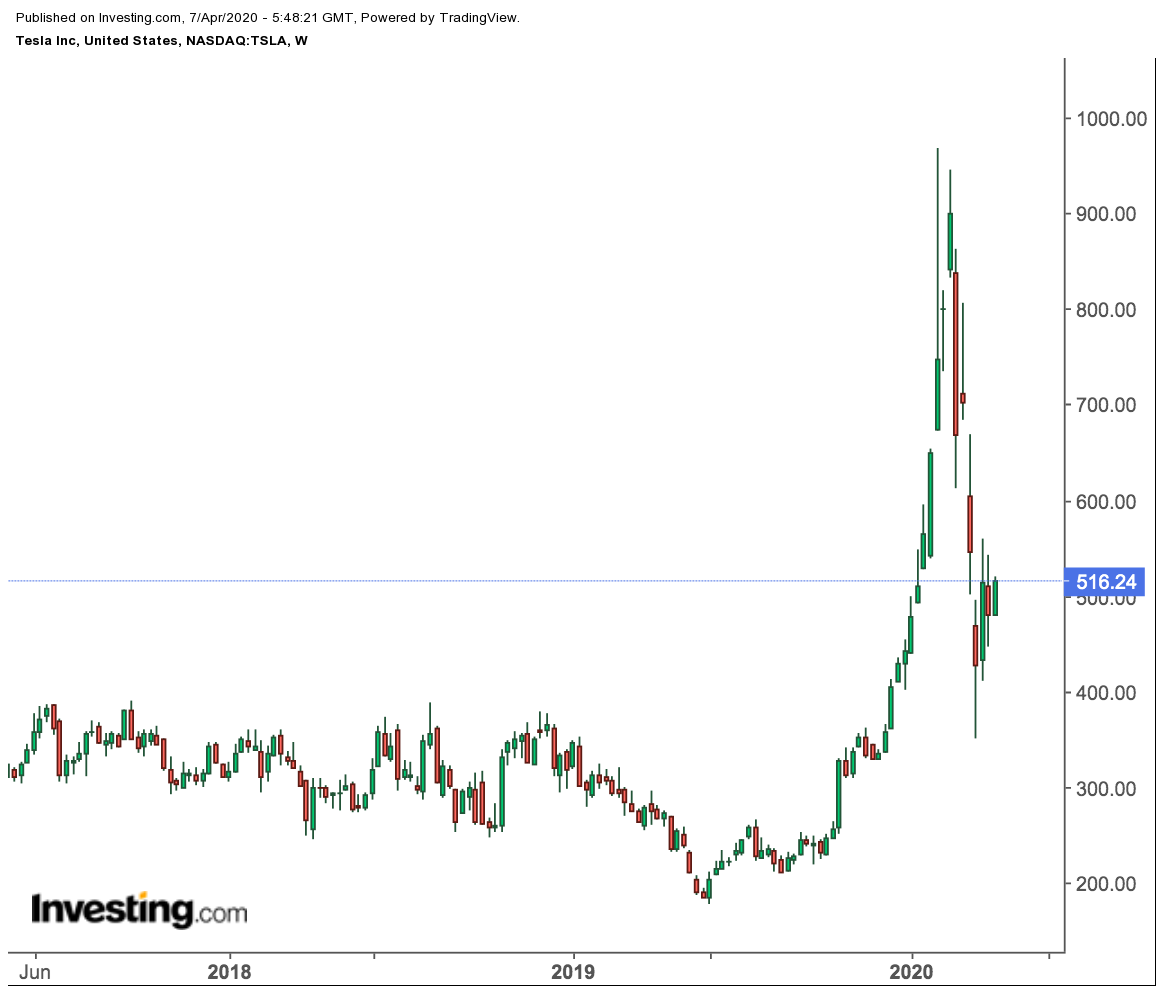The recent rally in Tesla (NASDAQ:TSLA) shares is gaining momentum after a better-than-expected sales report raised expectations that the electric carmaker could be in a stronger position to withstand the coronavirus-triggered slowdown.
The company said Thursday it delivered 88,400 vehicles worldwide in the first quarter, down 21% from the last three months of 2019. But the total was still better than analysts’ average estimate for about 78,100.
Tesla has surged more than 15% during the last three sessions, on this positive surprise, closing yesterday at $516.24. The resurgence puts Tesla in the camp of those growth stocks delivering increased returns at a time when the economy is slipping into a recession.
Tesla is up 23% this year against a 17% decline in the benchmark S&P 500 Index.

After 1Q sales data release, Jefferies upgraded the shares to a buy, saying earnings and free cash flow should be supported by “better productivity.”
Despite this optimism, other analysts are advising investors to trade Tesla stock with caution as the latest numbers don’t reflect the extent of damage coming from the coronavirus shock.
According to Cowen analyst Jeffrey Osborne, Tesla’s production utilization was quite low in the quarter compared to stated capacity levels, even factoring in shutdowns.
“Free cash flow in the first quarter is likely not as bad as we feared, but second-quarter setup still looks rough, and we still expect a U-shaped recovery in 2H of 2020,” Osborne, who has a $285 a share target on the stock, said in a note.
Slumping Demand
Bulls rallied behind Tesla this year, when founder and CEO Elon Musk, after years of over-promising and under-delivering, successfully turned a corner. The company beat analyst revenue estimates for 4Q and accelerated the introduction of the new Model Y crossover.
As well, the completion of its Shanghai factory and the company's success in exceeding its ambitious goal of selling 360,000 vehicles for the year also offered a powerful signal that Tesla could rapidly become a meaningful industry player if it continues to meet its targets.
But that upbeat scenario is now under serious threat from the impact of the deadly virus in China and globally, which is disrupting supply lines and increasing the risk of a recession. Car deliveries may plunge more than 12% from last year to 78.8 million, according to the IHS Markit forecast carried by Bloomberg, down 10 million units from the researcher’s expectations in January.
While providing 1Q sales data, Tesla didn’t give an update on whether it will be able to meet its 500,000 unit target for car sales this year. The company also didn’t say how many vehicles it built during the quarter at its plant near Shanghai, which started production late last year.
Needham analyst Rajvindra Gill believes it would be better to remain cautious on Tesla as demand for cars has largely collapsed in North America and Europe. In a note last week Gil said:
“In the long-term, we continue to expect margin pressure from declining sales of higher-margin Model S & X vehicles, a lower mix within Model 3, and competitive pressures from other automakers as they launch their electric vehicles over the next few years.”
Bottom Line
Tesla is certainly outperforming the market in this very challenging environment, backed by some real progress in its production capability and deliverables.
At the same time, it would be naive to assume that the automaker can escape the damage caused by the COVID-19 pandemic. The company’s first-quarter earnings report this month, tentatively scheduled for Wednesday, Apr. 29 after the close, should be able to provide more clarity.
